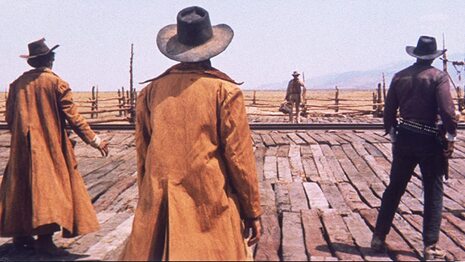B+ | A newly-widowed woman must defend her late husband's property from a railroad baron. Directed by Sergio Leone Starring Henry Fonda, Claudia Cardinale, and Charles Bronson Review by Jon Kissel |

Released two years after Leone had completed his Dollars trilogy, Once Upon a Time in the West is both a continuation of the Spaghetti Western that Leone popularized and a movement away from it. A Fistful of Dollars and For a Few Dollars More are both adaptations of Akira Kurosawa samurai films. The Good, the Bad, and the Ugly is more original, but all three films share a reliance upon archetypes more than arcs. With Once Upon a Time in the West, characters are attempting to change their station or their perception in a way that Clint Eastwood’s Man With No Name is not. That character would pass through town and help Jill McBain with her problems, or team up with Cheyenne against Frank and Mr. Morton, but the movie wouldn’t be about them. There’s nothing wrong with Leone’s earlier procedural approach, where a protagonist is solving some dilemma before riding off to their next adventure, but Once Upon a Time in the West feels more contained and therefore more serious.
Seriousness might imbue meaning, but that doesn’t mean Once Upon a Time in the West is more entertaining than some of Leone’s other work. His standout remains Good, Bad, Ugly, a film that’s equally long but moves at a quicker pace. So much of this film plays out in pauses and staring contests. Though these scenes play out as an appreciated replay of the opening, where both parties are considering their looming deaths or the commitment of a murder and/or theft and time must be taken in the consideration, it does get a little interminable after the sixth or seventh face-off.
If a director is going to just let his audience sit in simmering tension, Leone must be allowed the latitude to do that if he’s going to do it so well. There are incredible shots throughout this film, accentuated by Ennio Morricone’s score. Harmonica being revealed by Cheyenne in the ‘truck stop’ demanded several rewinds, one of many chill-inducing introductions or reveals. Charles Bronson, as Harmonica, has a leathery mug that demands close-ups. The film has its greatest admiration for his character, providing him with a painterly childhood tragedy that’s not revealed until the film’s final minutes and a diegetic musical intro that gives him his name.
Even if I’m a little impatient with Once Upon a Time in the West, there’s so many precise observations about America that I can tough out the waiting. Lots of featured extras and side characters are shown going about their lives like everything is on the up and up, when in actuality, they all effectively live in a monarchy with Morgan and men like him as their king. They’re benign rulers as long a citizen doesn’t wander into their path, at which point they’re crushed. The auction scene is played as something of a joke, but it’s an infuriating travesty and an example of a rigged game that’s not even trying to hide its corruption. The frontier is where the West goes to refresh itself and release society’s pressure valve. Those that believe in it are hopeful that things will be different than they were in the past but the truth always asserts itself: there is no new world that the old one can’t subvert in its own image. The lords and the earls are always close behind, and their knights will always do their bidding for them until they too are corrupted. Things work out for Jill by the end, but there’s another Mr. Morgan coming along, with another Frank in tow. Maybe she can withstand the tide, or maybe, like so many others, she gets washed away. B+
 RSS Feed
RSS Feed